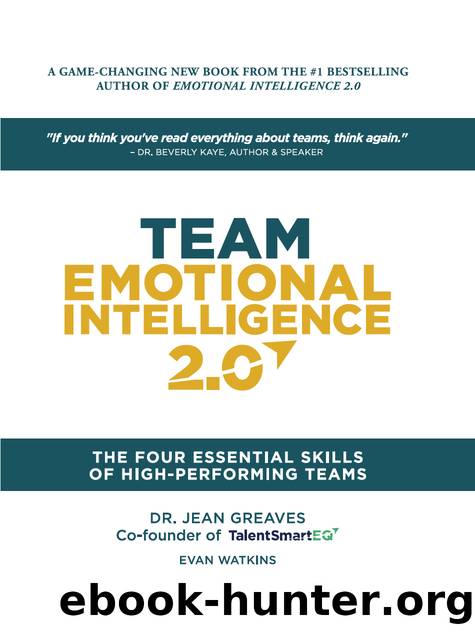Team Emotional Intelligence 2.0 by Jean Greaves

Author:Jean Greaves
Language: eng
Format: epub
Publisher: TalentSmart
10
Make Better Use of Team Time
Time flies when youâre having fun, and it crawls when you feel bored. Both time-bending experiences are backed by science and suggest that time is a curious force to be reckoned with in your teamâs work. To make the most of your time, first tune in to everyoneâs feelings. Then, adjust your use of time accordingly.
Team meetings offer one great place to tune in. Once ârepeat indefinitelyâ gets dropped in your teamâs schedule, the routine creates feelings of boredom as people go on autopilot. Reengage your weary team members with refreshing changes that fit the work. Try reducing how often you meet for a while, and give yourselves the gift of time. Or, if you have a meaty topic underway that will irritate everyone not to finish, stop mid-course and move the topic to a devoted second session. You may also find that changing the length of your meeting can make a big difference. Your thirty-minute weekly check-in could be more efficient and energetic in twenty minutes, or the fifteen-minute logistic-based update is better longer to allow people to share and troubleshoot their challenges. As you see team membersâ energy waxing or waning, pay attention to what those feelings are telling the team, and adjust your approach.
Another team arena to tune into feelings and time is on an individual level. How do your team members use their time across the work week? Each person may not have complete control over how they make room for thinking time, time to get things done, meeting time, or bonding time, but they will have definite preferences that fit their personal rhythms. As a group, discuss ways to maximize when and where you fit in these very different types of work. What are the days and times of day that help you capitalize on how you feel (e.g., most able to concentrate and focus)? By discussing how to make better use of your time openly and formally, the whole team will learn each otherâs specific individual preferences. These insights will help everyone respect and optimize important rhythms that propel the work that they do.
Add one last way to protect each otherâs time: Make it okay or even a team norm to say, âNow is not a good time. How about later?â With open-door policies, people often feel like they canât turn someone away without being rude. The problem with this is that one personâs break time can be anotherâs crucial time that week to concentrate.
Time and emotions go hand-in-hand, so tune in to how youâre feeling to notice how youâre using your time and your teammatesâ time. Likewise, make better use of your team time to help manage how youâre feeling.
Download
This site does not store any files on its server. We only index and link to content provided by other sites. Please contact the content providers to delete copyright contents if any and email us, we'll remove relevant links or contents immediately.
| Ethics | Etiquette |
| Fashion & Image | Health & Stress |
| Motivation & Self-Improvement | Work Life Balance |
| Workplace Culture |
Tools of Titans by Timothy Ferriss(8396)
Change Your Questions, Change Your Life by Marilee Adams(7783)
Deep Work by Cal Newport(7085)
Playing to Win_ How Strategy Really Works by A.G. Lafley & Roger L. Martin(6309)
Man-made Catastrophes and Risk Information Concealment by Dmitry Chernov & Didier Sornette(6019)
Big Magic: Creative Living Beyond Fear by Elizabeth Gilbert(5774)
Digital Minimalism by Cal Newport;(5765)
Ego Is the Enemy by Ryan Holiday(5450)
The Slight Edge by Jeff Olson(5418)
The Motivation Myth by Jeff Haden(5213)
The Laws of Human Nature by Robert Greene(5208)
Stone's Rules by Roger Stone(5088)
Tuesdays with Morrie by Mitch Albom(4784)
Eat That Frog! by Brian Tracy(4541)
Rising Strong by Brene Brown(4464)
Skin in the Game by Nassim Nicholas Taleb(4250)
The Money Culture by Michael Lewis(4207)
Bullshit Jobs by David Graeber(4192)
Skin in the Game: Hidden Asymmetries in Daily Life by Nassim Nicholas Taleb(4007)
